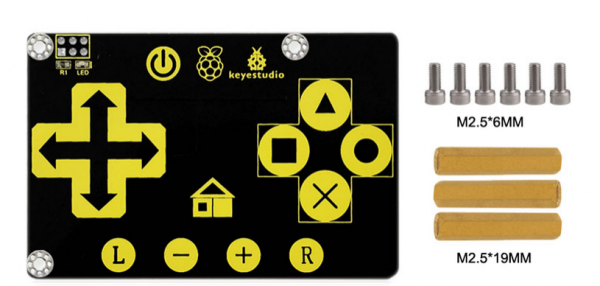Ks0210 keyestudio RPI TTP229L 16-key Capacitive Touch Keypad: Difference between revisions
Keyestudio (talk | contribs) |
Keyestudio (talk | contribs) |
||
| Line 115: | Line 115: | ||
== Documents== | == Documents== | ||
* '''PDF File:''' <br> | * '''PDF File:''' <br> | ||
https://drive.google.com/open?id= | https://drive.google.com/open?id=1mzAuGp2Le6845JGSNgh971emrum0bHTn | ||
* '''Libraries:''' <br> | * '''Libraries:''' <br> | ||
| Line 128: | Line 128: | ||
<br> | <br> | ||
== Get One Now == | == Get One Now == | ||
*[https://www.keyestudio.com/keyestudio-rpi-ttp229l-16-channel-touch-shield-for-raspberry-pi-ce-certification-p0473-p0473.html '''Official website''' ] | *[https://www.keyestudio.com/keyestudio-rpi-ttp229l-16-channel-touch-shield-for-raspberry-pi-ce-certification-p0473-p0473.html '''Official website''' ] | ||
Revision as of 10:30, 19 April 2019
Introduction
This keypad is designed for Raspberry Pi and supplies your Pi with 16 keys. It has an I2C communication mode and uses 3.3 V supply voltage with a power indicator.
We provide you with installation package, source codes and a document to help you complete your programs.
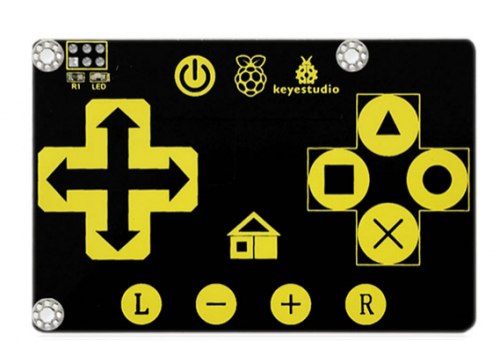
Specification
- Chip: TTP229-LSF
- Supply Voltage: 3.3V
- Interface: I2C
Shipping List
- keyestudio RPI TTP229L 16-key Capacitive Touch Keypad x1
- M2.5*6MM screw x 6
- M2.5*19MM copper pillar x 3
Connection Diagram
Plug it directly into Raspberry Pi to start your works as shown in below figure.
After power-on have about 0.5sec stable-time. During the time do not touch the key pad, and all functions are disabled.
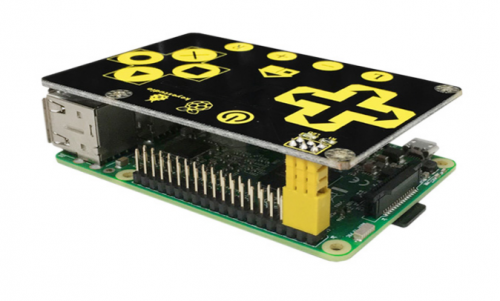
Sample Code
#include <bcm2835.h>
#include <stdio.h>
#include <unistd.h>
unsigned char WriteBuf;
unsigned char WriteBuf1;
unsigned int ReadBuf0;
int main(int argc, char **argv)
{
if (!bcm2835_init())
return 1;
bcm2835_i2c_begin();
bcm2835_i2c_setSlaveAddress(0x57);
bcm2835_i2c_set_baudrate(10000);
printf("start..........\n");
while(1)
{
WriteBuf = 0x00;
bcm2835_i2c_write_read_rs(&WriteBuf,2,&WriteBuf1,2);
bcm2835_i2c_read (&ReadBuf0,2);
printf("TTP229:%d\n",ReadBuf0);
printf ("\r");
fflush (stdout);
bcm2835_delay(100);
}
bcm2835_i2c_end();
bcm2835_close();
return 0;
}
Program Writing
1.Installing bcm-2835 Library
Here is the tutorial for installing bcm-2835 library in Raspberry Pi. To install bcm-2835, first we need to download bcm2835 library. So we will provide an installation package or click its official web http://www.airspayce.com/mikem/bcm2835/ to download it.
Step1: Now after downloading library, copy it in any folder of your raspberry pi by winSCP(we provide its installation package, but please refer to usage by yourselves).
Step2: Now it’s time to extract the library, so open terminal of raspberry pi and go to the folder where you have copied your library and type this command: tar zxvf bcm2835-1.26.tar.gz
Step3: Now to into library folder, type this command: cd bcm2835-1.26
Step4: Now, we are ready to install bcm2835 library, so to start installation type this command: ./configure
Step5: then type this command: make
Step6: then this: sudo make check
Step7:and finally this: sudo make install
Congrats your library is installed. Now use “#include <bcm2835.h>” in your program to use bcm2835 library.
2.Programming
Now it's time to write a program. If you need to create a new directory within raspberry pi, you can use the ‘mkdir’ command. So type at your terminal: mkdir rpi_shield
then copy the file rpi_TTP229L provided by us and put it into the directory rpi_shield through winSCP. Next, type this command: cd rpi_TTP229L to go inside the rpi_TTP229L folder.
Then type this command: make to make an executable file; This means this is the file we run to launch the program as shown in below figure.
To make a new directory, you just need to add the name of the directory after the command, such as 'mkdir new_directory'.
Finally type this: sudo ./TTP229 to launch the program.
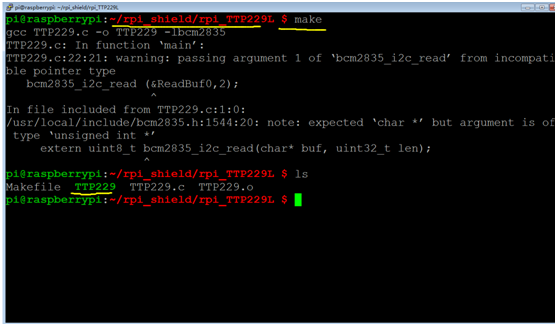
Result
Touch the keys, and corresponding value is printed on the terminal as shown in below figure.
Use Ctrl+C to exit the processing program.

sudo ./TTP229 to running program
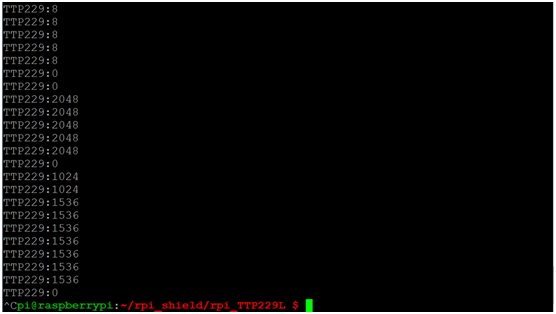
Touching different keys to print various value
Documents
- PDF File:
https://drive.google.com/open?id=1mzAuGp2Le6845JGSNgh971emrum0bHTn
- Libraries:
https://drive.google.com/open?id=1YiotA1_YywxBC6e-vhe5NqDApinmMwxX
- Code:
https://drive.google.com/open?id=16er-T8rqGNWJlm12jUkCXNjcSPyysc5e
- Installation Tool:
https://drive.google.com/open?id=1Gb_QSIF88zyKsN_UNwtbo0URfmBoP-F-
